Announcement about the Suspension of PD’s Activity in the Public Monitoring Working Group of the Investigative Committee of Armenia
Along with a number of prominent non-governmental organizations (hereafter NGOs) actively operating in Armenia, Peace Dialogue NGO (hereafter PD) has been involved in the Public Monitoring Working Group(hereafter Group) initiated by the RA Investigative Committee (hereafter IC) since November 2018. The group now includes eight NGOs and one foundation.
The group was established to investigate criminal cases involving non-combat deaths during military service: to identify the system’s shortcomings, omissions and problems during the investigation of individual cases and present them to the Investigative Body and the general public.
According to the agreement between the IC and Group’s member NGOs, suspended or terminated criminal cases were to be investigated in the initial phase of the Group’s work.
While remaining firmly committed to the Group’s mission and goals, PD announces suspension of its activity in the Group on the following grounds:
1. Despite the fact that the Group’s member NGOs signed a document on non-disclosure of confidential, pre-investigation materials they uncovered as part of the Group’s activities, the IC has not provided copies of criminal case materials.
- The IC has denied the request for issue of copies of materials from the criminal case involving Valeri Muradyan’s death reported on 14 March 2010 in the Haykazovmilitary unit in Stepanakert. Instead, it offered that Group members could get acquainted with the materials by reading a brief reference on the criminal case prepared by the IC investigators. Further, they said, in case of necessity, they would give the Group the opportunity to get acquainted with the materials in a review space allocated by the IC. As justification for its refusals, the IC referred to articles 59 and 80 of the Armenian Penal Code. The latter, however, defines the rights and obligations of the victim and the status of the victim’s successor. Thus, in our opinion, these statutes are not directly related to the subject matter and do not justify the rejection of a request for providing copies of materials.
- We find that it impossible to get a complete picture of official inaction, abuses, illegality and omissions made during the pre-investigation phase of the criminal cases. We cannot do this by examining references made by investigators who, in some cases, unreasonably suspended or terminated the criminal cases. The fact that the organization operates from Vanadzor causes additional technical problems for PD staff, who must travel to the site (in Yerevan) allocated by the IC in order to get acquainted with materials of criminal cases.
- As an alternative to the abovementioned arrangement, the IC offered, in March 2019, another mechanism by which Group members could get acquainted with the criminal case materials. This set-up stipulated that Group member NGOs could be officially recognized by the victim’s successors (relatives of the deceased servicemen) involved in the criminal proceedings. They would be given status as the victim’s successors’ representative.
Under this arrangement, Group member NGOs were meant to be able to get acquainted with the cases without any barriers. However, this approach raises questions about the necessity of the Group as such. This is because any human rights organization not involved in the public monitoring Group can use such an “opportunity”. Basically, there are no legal barriers for human rights defenders that are not involved in the Group, provided they are recognized as victims’ legal successors in their criminal cases. They can represent their own positions on the shortcomings and violations that occur during the investigation of cases as based on their findings and analyses. They can also develop and make their own suggestions for legal reforms. Furthermore, irrespective of involvement in the abovementioned Group, both the IC and any other investigating body are obliged to proceed and initiate proceedings on the announcement (reporting) of crimes as conveyed by human rights defenders or any citizen. The IC must then take steps to address the legal issues and work toward a solution.
2. The IC did not take any steps to detect numerous instances of illegality, omissions, fraud and official inaction that were uncovered by our organization during the investigation of the criminal case involving the death of serviceman Grigor Hermon Avetisyan. Nor did they do anything to bring the suspected criminals to justice (i.e. those who are guilty).
- In spite of the fact that PD should have conducted the investigation into the criminal case of Valeri Muradyan’s death, in response to a statement made by the Deputy Head of the IC, Artak Krkyasharyan, that the IC is open to the provision of information on issues uncovered by Monitoring Group member NGOs during investigation of criminal cases related to the deaths of servicemen in the Armed Forces, our organization sent a reference to the IC on 8 May 2019 reporting numerous gaps and shortcomings we uncovered as concerns the investigation of the criminal case of serviceman Grigor Hermon Avetisyan’s death reported on 6 April 2016.
It is noteworthy that the choice of the case was not accidental. As a result of the same incident, which caused Grigor Avetisyan’s death, his fellow serviceman Suren Artur Aramyan also died at the same time. In 2018, these double murder cases were artificially separated by the Investigative Body. The separated case of Suren Aramyan’s murder was suspended by the Investigative Body on grounds that all investigative actions taken to find the murderer were ineffective. It is also worth mentioning that the criminal case initiated concerning the death of Suren Aramyan is one of the cases meant to be investigated by the Group.
- Taking into consideration the fact that the reference sent by us was actually the first case sent after the formation of the Group (according to procedures stipulated by the Armenian Freedom of Information Act), we requested, in a letter attached to the reference, that our organization be provided with information about concrete actions taken or to be taken to address aforementioned gaps and eliminate the shortcomings pointed out in our reference. However, instead of doing so, in response to a 27-page reference letter addressed to the Head of the RA Investigative Committee, we received a response dated 5 June 2019 wherein the Deputy Head of the General Military Investigative Department, G. Mayilyan, simply notified us that the reference had been reviewed by the RA Investigative Committee’s General Military Investigative Department and sent to the IC so it could be addressed during regular discussions in the working group.
- When engaging with the group, we expected that, as a result of Group activities, practical steps would be taken to eliminate revealed shortcomings, to identify perpetrators, and to bring them to justice. The reference on Grigor Avetisyan’s case reports a number of suspected crimes. Thus, the Investigative Body should have taken into consideration those sections in the report in the light of regulations stipulated by RA Law on criminal reports. That is to say, it should have initiated a proceeding or proceedings based on the materials contained in the reference. It should not have opted to send the material to the working group so that it could be addressed in regular discussions. By the way, it remains unknown if and when such discussions will take place. Obviously, practical steps taken by the IC suggest that criminal proceedings with concrete phases should be initiated and implemented against the Investigative Committee’s General Military Investigative Department, the Military Police, the investigators, and the prosecutors of the Military Prosecutor’s Office, i.e. their own partners. This will undoubtedly require exceptional political will: such resolve seems to not yet exist in today’s Investigative Bodies, not even after the Revolution.
3. Over the past eight months, the Group’s activities have not contributed to the detection of non-combat deaths in the Armed Forces and have thus deepened distrust among the victims’ successors towards the activity of Investigative Bodies in general.
- Early in 2019, when a number of media outlets began to speak about the Group established at the initiative of the IC, relatives of soldiers killed in non-combat situations expressed their concern about the Group’s effectiveness and, in general, about the necessity of its existence. To a large extent, due to distrust created and reinforced over the years towards the Armenian judicial-legal system and towards investigative bodies, many people view this group as being just for show. They feel it is unable to contribute to the revelation of the real causes of death of their relatives and to bring the actual perpetrators to justice. Besides the aforementioned, relatives of a number of dead soldiers in non-combat conditions have assured us that so far the Group’s work has not contributed to the revelation of their relatives’ real causes of death. To the contrary, the Group’s work has limited their opportunities to address their concerns and demands to government officials. This is because public officials now only respond by stating that the public Monitoring Group established at the initiative of the RA IC implements activities to address concerns raised by victims’ successors. This, however, in cases of the aforementioned unresolved issues, is not true.
Based on the abovementioned, we state that efficient work by the public monitoring group conducting investigations into criminal cases related to cases of non-combat deaths during military service will not be possible as long as:
a) There are no legally based approaches and mechanisms for organizations involved in the Group to acquaint themselves with materials from the criminal cases;
b) Investigators have not done away with malicious habits and practices that have been formed over decades.
For many years, the Investigative Bodies infested with corruption have not been able to develop the political will to disclose factual information on cases, where such disclosure or revelations would run contrary to their “principles of corrupt ethics”. Therefore, we believe that parallel to the judicial system vetting process launched in the Republic of Armenia, it is necessary to begin a rehabilitation process for the Investigative Bodies. This is the only thing that will restore and reinforce public trust in the activities of the Investigative Bodies conducting criminal proceedings on non-combat deaths in the Armed Forces.
We declare that our organization will continue its activities aimed at the protection of the rights of servicemen who have died in non-combat situations during their military service. We will continue using other platforms and other measures as established by law. This is because the absence of legally-based approaches and mechanisms, alongside the System’s inability to rid itself of corruption, hinders and distorts our organization’s mission when carrying out Group activities.
Peace Dialogue
non-governmental organization
10 June 2019
Posted: August 2nd, 2019 under Announcements.
Comments: none




 “The “Nation-Army” Concept and its activities, in particular the “Law on Military Service and the Status of Military Servicemen” adopted by the National Assembly in 2017, contains numerous risks, that is why the Yelk (Exit) faction voted against the draft law. We believe the involvement of different civil society groups in the process of implementing the “Nation-Army” concept to be insufficient. There is a critical gap in terms of civilian control over the activities of the Armenian Armed Forces.”
“The “Nation-Army” Concept and its activities, in particular the “Law on Military Service and the Status of Military Servicemen” adopted by the National Assembly in 2017, contains numerous risks, that is why the Yelk (Exit) faction voted against the draft law. We believe the involvement of different civil society groups in the process of implementing the “Nation-Army” concept to be insufficient. There is a critical gap in terms of civilian control over the activities of the Armenian Armed Forces.”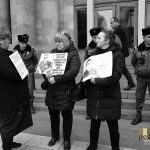 Along with a number of other non-governmental organizations operating in Armenia, Peace Dialogue NGO has, since November 2018, been involved in the public monitoring group established by the RA Investigative Committee (hereafter IC). The group now includes eight NGOs and one foundation.
Along with a number of other non-governmental organizations operating in Armenia, Peace Dialogue NGO has, since November 2018, been involved in the public monitoring group established by the RA Investigative Committee (hereafter IC). The group now includes eight NGOs and one foundation. Peace Dialogue NGO initiated strategic litigation to protect the interests of military servicemen who graduate from military educational institutions and refuse to pursue post-educational contracted military service. Lawyer Artur Sukiasyan filed a complaint to the courts, on behalf of PD, with a demand to strike down the provision in the Government Decree that had been imposed on him.
Peace Dialogue NGO initiated strategic litigation to protect the interests of military servicemen who graduate from military educational institutions and refuse to pursue post-educational contracted military service. Lawyer Artur Sukiasyan filed a complaint to the courts, on behalf of PD, with a demand to strike down the provision in the Government Decree that had been imposed on him.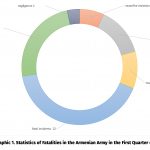
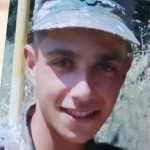 On 6 May 2018, at approximately 7:30 a.m., the body of
On 6 May 2018, at approximately 7:30 a.m., the body of 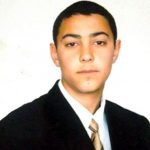
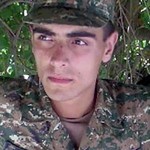 After exhausting all possibilities for recourse in the Armenian courts concerning the case of his brother’s death, Onik Manucharyan (brother and legal successor to soldier Manuchar Manucharyan) filed a lawsuit to the European Court of Human Rights. His brother Manuchar died on 31 July 2013 at the base for the RA MoD Military Unit N24923. The official cause of death was reported to be death by suicide.
After exhausting all possibilities for recourse in the Armenian courts concerning the case of his brother’s death, Onik Manucharyan (brother and legal successor to soldier Manuchar Manucharyan) filed a lawsuit to the European Court of Human Rights. His brother Manuchar died on 31 July 2013 at the base for the RA MoD Military Unit N24923. The official cause of death was reported to be death by suicide.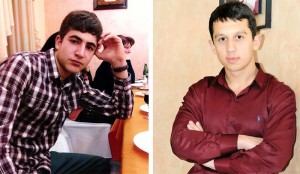 On 6 April 2016, Grigor Avetisyan and Suren Aramyan were killed at a military base. Two days later, Davit Dumikyan turned himself in and allegedly confessed to the Vardenis Military Police Department. He allegedly said that he murdered both Mr. Avetisyan and Mr. Aramyan. Later, Dumikyan withdrew his confession and insists it was extorted from him by a tall colonel: a Military Police employee.
On 6 April 2016, Grigor Avetisyan and Suren Aramyan were killed at a military base. Two days later, Davit Dumikyan turned himself in and allegedly confessed to the Vardenis Military Police Department. He allegedly said that he murdered both Mr. Avetisyan and Mr. Aramyan. Later, Dumikyan withdrew his confession and insists it was extorted from him by a tall colonel: a Military Police employee.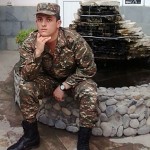 According to preliminary information, on 8 May 2015 at approximately 3:15 p.m., soldier Harutyun Hambaryan, a military serviceman in the MOD N military unit, died from a gunshot wound to the front of his head. The shot was fired from an AKMS machine gun.
According to preliminary information, on 8 May 2015 at approximately 3:15 p.m., soldier Harutyun Hambaryan, a military serviceman in the MOD N military unit, died from a gunshot wound to the front of his head. The shot was fired from an AKMS machine gun.